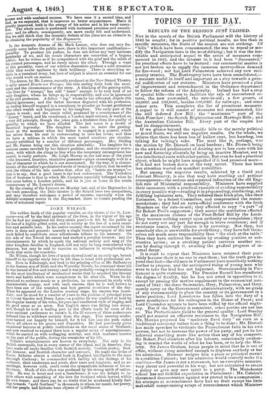JOHN WILSON.
The sudden death of this popular vocalist, on the shores of the St. Law- rence—cut off by the fatal epidemic of the time, in the vigour of his age (for he had not completed his forty-ninth year)—is felt by the public as the loss of a highly-gifted artist, and in society as the loss of a most excel- lent and amiable man. In his native country the regret occasioned by the news is deep and general: scarcely a single Scotch newspaper of the last week failed to contribute some affectionate tribute to his memory. On this side of the Tweed his career had excited a peculiar interest; and the entertainments by which he made the national melody and song of the sister kingdom familiar in England, will not only be long remembered with pleasure, but may be said to exercise an influence in strengthening the bonds that unite the countries.
Mr. Wilson, though his love of music showed itself at an early age, betook himself to its regular study later in life than is usual with professional art- ists. Born iu Edinburgh, and bred in the printing-office of Mr. Ballantyne at the famous sera of Scott and the Waverley Novels, he remained there till he was turned of five-and-twenty; and it was probably owing to his education for the most intellectual of mechanical trades that he acquired the literary tastes and habits which were conspicuous in his after life. When he de- termined to embrace music as a profession, he commenced its study with characteristic energy, and with such success, that he is well known to have been one of the soundest and best general musicians of the day. When he appeared on the London musical stage, his success was imme- diate; and he stood for a number of years in the position of principal tenor at Covent Garden and Drury Lane,—a position he was qualified to hold by the singular beauty of his voice, his pure and unaffected style of singing, and his good sense as an actor. But English opera was falling into decay; and, though he took a leading part in the efforts 'made by some of the more eminent performers to susta'n it, the ill success of those endeavours induced him to withdraw entirely from the stage. This seeming misfor- tune turned out happily for himself, for it led him into the path suited above all others to his genius and disposition. He had previously given occasional lectures at public institutions on the vocal music of Scotland; and now resolved to expand these into a regular series of entertainments, which he carried on with unflagging activity, and. with unabated interest on the part of the public, during the remainder of his life. Wilson's entertainments are known to everybody. Not only in the British metropolis, but in every corner of the island, and in America, they have made all ranks familiar with Scottish melody. Scottish poetry, Scot- tish humour, and Scottish character and manners. He made the lyrics of Barns, hitherto almost a sealed book in England, intelligible to the most thorough Cockney; he commanded with facility all the feelings of his audience, their tenderness and mirth, their tears and laughter; and no as- semblage, however cold, could resist the sympathetic influence of his en- thusiasm. Much of this effect was produced by his strong spirit of nation- ality. He was in heart and soul a Scotchman; it was his delight to in- spire others with something of the love for Scotland which burned within his own breast; and there can be no doubt that he awakened• kindly feel- ings towards "Auld Scotland" in thousands to whom her music, her poetry, abd her people, had hitherto been objects of indifference.


























 Previous page
Previous page